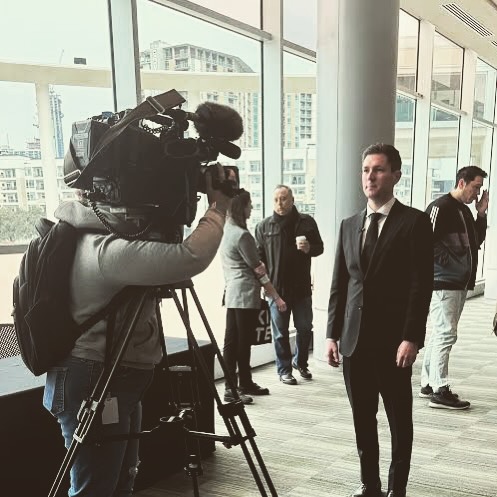Chris Fronda is the creator of the LOGIC MOVEMENT, dedicated to making logic accessible to everyone. With a background as a Product Manager at a Fortune 1000 company and experience as a self-taught software developer and entrepreneur, he is considered an expert in logic and deep tech. Chris began his career at National Instruments, where he managed a $25 million product line, and later ran a systems integration business working with clients like Apple, NASA, and Pfizer. He has also been involved in cutting-edge web, mobile, and blockchain projects, including building apps that were ahead of Snapchat and Instagram. In 2018, Chris shifted his focus to researching Formal Logic, driven by a desire to address issues like misinformation, the education gap, and the future of learning. His passion led to the creation of Logictry, a platform designed to democratize access to knowledge and opportunity. Chris’s mission is to empower anyone with a desire to learn by providing the tools and resources they need to thrive. Through Logictry, he strives to make logic free and accessible to all.
Can you share the inspiration behind the LOGIC MOVEMENT and how your journey led you to prioritize the democratization of logic and education?
The inspiration for the LOGIC MOVEMENT stemmed from a deep-rooted passion for truth-seeking and problem-solving, nurtured by my early love for logic, debate, and chess. Growing up with a mother who was an educator focused on children with special needs and those from poor socio-economic backgrounds, I learned the importance of ensuring that every child has a chance to succeed. This belief in equal opportunity became a core value in my life. As I transitioned into the world of technology and entrepreneurship, I began to question how technology could be used not just to innovate but to address societal issues like misinformation and educational inequity. My research into Formal Logic, especially its teaching at institutions like Oxford, revealed the critical role logic plays in developing critical thinking and decision-making skills. The founding of Logictry on the same day the UN launched World Logic Day felt like a sign that this mission was both timely and necessary. The LOGIC MOVEMENT was born out of a desire to democratize access to logic and education, ensuring that everyone, regardless of background, can develop the skills to think critically and make informed decisions. In pursuit of bringing more public awareness to the LOGIC MOVEMENT Co-Founder and partner, Chelsea Toler, secured a partnership between the UN and Logictry to host World Logic Day in our home Austin, TX. Over the last three years and together with our team we have grown this convening to become the largest World Logic Day celebration in the world being recently featured on KXAN, KVUE, and FORBES.
How did your experiences as a Product Manager and entrepreneur shape your vision for making logic accessible to everyone?

My experience as a Product Manager at National Instruments, where I managed a $25 million product line, taught me the importance of creating products that are not only innovative but also accessible and beneficial to a wide audience. This experience, combined with my entrepreneurial ventures, reinforced the idea that technology should be a tool for empowerment. However, I also recognized that technology alone isn’t enough; it must be paired with educational resources that are accessible to everyone. This is where Logictry’s Interactive Content comes into play. By offering personalized learning paths and tools that guide individuals through complex decision-making processes, we aim to make formal logic not just an abstract concept, but a practical, everyday tool that can be used by anyone, anywhere.
What challenges did you encounter when transitioning from technology and product development to focusing on formal logic and education?
Transitioning from the tech industry to focusing on formal logic and education brought several challenges. One of the biggest was shifting from a product-driven mindset, where success is often measured by metrics like user adoption and revenue, to an education-driven approach, where the impact is more nuanced and long-term. Another challenge was making the abstract concepts of formal logic accessible and engaging to a broader audience. With Logictry, we tackled this by developing Interactive Content that doesn’t just teach logic but also guides users through real-world scenarios, helping them apply logical principles to complex decision-making. Lastly, there was the challenge of ensuring that our content was rigorous enough to be respected in academic circles while remaining accessible to everyone, particularly those who, like my mother’s students, might not have had the same education opportunities.
In your research on formal logic, what were the most significant findings regarding the impact of misinformation and the education gap on society?
One of the most significant findings was the interplay between misinformation and the education gap. Misinformation thrives in environments where critical thinking skills are underdeveloped, often in communities with limited access to quality education. This creates a vicious cycle: individuals without these skills are more susceptible to misinformation, which further hampers their ability to make informed decisions and limits their opportunities. I also found that while technology has the potential to democratize access to information, it can reinforce existing inequalities if not paired with efforts to enhance critical thinking and logic skills. This is why it’s crucial to integrate formal logic into mainstream education and why Logictry’s Interactive Content is designed to bridge this gap by offering tools that help users critically evaluate information and make better decisions.
How does Logictry work to bridge the wealth and education gaps, and what specific tools or resources does it provide to empower individuals?
Logictry bridges the wealth and education gaps by making logic and critical thinking accessible to everyone, regardless of their socio-economic background. Our platform offers Interactive Content that guides users through complex decision-making processes, helping them develop the skills they need to thrive. We provide personalized learning paths that adapt to each user’s knowledge level, ensuring that everyone can learn at their own pace. These tools are offered at little to no cost to eliminate financial barriers, making them available to individuals who might otherwise lack access to such resources. In addition, our content is designed to be relevant to real-world situations, enabling users to apply what they learn directly to their lives—whether that’s making better decisions at work, understanding complex social issues, or improving their academic performance. This approach not only helps bridge the education gap but also supports the impact my mother dedicated her life to achieving: ensuring that every child has a chance to succeed.
Your career includes working with high-profile clients like Apple, NASA, and Pfizer. How did these experiences influence your approach to problem-solving and decision-making?

Working with high-profile clients like Apple, NASA, and Pfizer taught me the importance of combining innovation with a deep understanding of user needs. These experiences showed me that the best solutions are those that are both groundbreaking and practical. This has influenced my approach to Logictry, where we emphasize evidence-based decision-making and the ability to think critically in dynamic situations. These clients also underscored the importance of collaboration and diverse perspectives in achieving the best outcomes. At Logictry, we’ve applied these lessons by developing Interactive Content that not only teaches logic but also helps users navigate complex decision-making processes in a way that’s informed by diverse viewpoints and real-world challenges.
You’ve developed apps that predated Snapchat’s Snapmap and Instagram’s Reels. What insights can you share about staying ahead of the curve in tech innovation?
Staying ahead of the curve in tech innovation requires a combination of foresight, flexibility, and a willingness to take risks. When developing apps that predated Snapchat’s Snapmap and Instagram’s Reels, I focused on understanding not just where the market was but where it was heading. This involves staying informed about emerging technologies, understanding user behaviour trends, and being willing to experiment with new ideas before they become mainstream. Another key insight is the importance of focusing on the core value proposition—what unique benefit does your product offer that others don’t? By staying true to that core value, you can avoid getting lost in the noise of trends and fads. Finally, building a passionate and innovative team is crucial because it’s the collective creativity and expertise of a diverse team that drives true innovation.
The LOGIC MOVEMENT emphasizes equal opportunity in education. How do you envision this movement evolving in the future, especially with advancements in AI and digital learning?
As AI and digital learning continue to advance, I see the LOGIC MOVEMENT evolving to leverage these technologies to further democratize access to education. AI, for example, can be used to create highly personalized learning experiences that adapt to the needs of each student, ensuring that everyone can learn at their own pace and in a way that suits their learning style. This could be particularly transformative for those who have been underserved by traditional education systems. Additionally, as digital learning platforms become more widespread, the LOGIC MOVEMENT will focus on ensuring that logic and critical thinking are central components of these platforms. Logictry’s Interactive Content, for instance, is designed to guide users through complex decision-making processes, helping them build the skills needed to navigate an increasingly complex and information-rich world. Ultimately, I see the movement growing into a global initiative, with partnerships across educational institutions, governments, and tech companies to make logic and critical thinking an integral part of education everywhere.
What role do you believe formal logic plays in improving decision-making in both personal and professional contexts, and how can it be integrated into mainstream education?
Formal logic plays a crucial role in improving decision-making by providing a structured framework for analyzing arguments, identifying biases, and evaluating the validity of information. In both personal and professional contexts, the ability to apply logical principles helps individuals make more informed and rational decisions, whether they’re navigating complex business challenges or personal life choices. Logictry’s Interactive Content is designed to teach these principles in a way that’s engaging and relevant to real-world situations, guiding users through complex decision-making processes step by step. To integrate formal logic into mainstream education, it’s important to start early, embedding logic lessons into the curriculum from a young age. This can be done through interactive methods such as games, puzzles, and real-world problem-solving scenarios that make logic both fun and practical. Additionally, educators should be trained to incorporate logical thinking across subjects, ensuring that students are consistently developing these crucial skills.
Looking back at your diverse career, what key lessons have you learned about the intersection of technology, education, and societal impact?
One of the key lessons I’ve learned is that technology, while a powerful tool, is only as impactful as the intent behind its use. At the intersection of technology, education, and societal impact, it’s crucial to approach innovation with a sense of responsibility—ensuring that the technology we develop serves to uplift and empower rather than exacerbate existing inequalities. I’ve also learned the importance of accessibility and inclusivity; if technology is to have a positive societal impact, it must be designed with the needs of all users in mind, particularly those who have been historically marginalized. Finally, I’ve come to understand that education is the most powerful tool we have for societal change. By using technology, like Logictry’s Interactive Content, to enhance and democratize education, we can address some of the most pressing issues of our time—from misinformation to economic inequality—and create a more just and equitable world, continuing the impact my mother dedicated her life to achieving.



